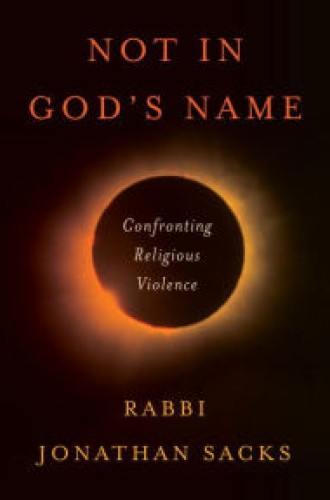Inside the other side
Violence seems to have permeated every dimension of our common life and every dimension of our imagination, and political leaders are putting it to political use, mobilizing fear and thus skewing policy and practice. Theological teachers and preachers must respond credibly to this public reality. Jonathan Sacks, the former chief rabbi of the United Hebrew Congregations of the British Commonwealth, has made a wise and important response.
Sacks begins his book with a large-scale analysis of public violence and its roots. He observes that in the 17th century the rise of Enlightenment rationality and its attendant ethos of tolerance, which transcended national sectarianism, permitted the promulgation of the Treaty of Westphalia. Thus a rough peace was guaranteed by secularization. More recently, however, that secularization has diminished in authority, so “religious violence” has been able to reemerge with immense energy.
Read our latest issue or browse back issues.
But so-called religious violence is not rooted in religion, and religion has nothing to do with generating it. Rather, Sacks suggests, the source of violence is found in a dualism that separates “us” from “them,” in Manichaean fashion, and that freely treats “them” with hostility and hatred.
Such a dualism occurs in three steps. First, the adversary—them—is dehumanized and demonized. Second, we come to regard ourselves as victims of them. Third, victimization creates a warrant for doing “altruistic evil”—that is, the elimination of them becomes a great good. Once this ideological reduction is set in motion, it can surface in mainstream monotheism as readily as it can anywhere else.
Sacks is rightly insistent that the Jewish interpretive tradition, followed by the catholic tradition of Christianity, powerfully refuses every such dualism. In an appeal to Isaiah 45:7, he witnesses to the God who “creates weal and woe” and thereby refuses all “splitting” that can turn violence into a religious or patriotic virtue.
The heart of Sacks’s powerful argument in the second part of his book consists of a compelling exposition of Genesis. He judges that pervasive violence is deeply rooted in the sibling narratives of Genesis that have set brother against brother, one preferred and one rejected—preferences and rejections that have been variously taken up by Jews, Christians, and Muslims with respect to Isaac and Ishmael and Esau and Jacob. Sacks contends that surface readings of these narratives, which set brother against brother and so feed ongoing hostility, are misreadings.
Sacks suggests an astonishing rereading of the narratives that appeals to the long tradition of rabbinic exegesis. His reading of Isaac and Ishmael is a counternarrative in which the chosenness of Isaac does not displace Ishmael. The rabbis understood that Abraham continued to love Ishmael and to care for him.
In a second case, he recognizes that by the end of the complex narrative of Esau and Jacob the two brothers have reversed roles. As a result, Jacob receives a second blessing, which is no longer about wealth and power, but rather a blessing of covenant.
Sacks’s third and most compelling exposition is of the Joseph narrative. Joseph, regally empowered in Egypt, toys with his brothers, frightening them with the threat of slavery. As a result, those who had sold Joseph into slavery years before come to “know from the inside what it feels like to be on the other side.” Sacks opines that this role reversal is “an education in otherness” so that the brothers can learn empathy. I have elsewhere proposed that the lament Psalms that address God in the petitionary imperative practice a “provisional role reversal” so the psalmist can “command” and God is summoned to obey.
Such role reversal, as I have seen it in the Psalms and as Sacks discerns it here, is counterintuitive; it breaks up all conventional assumptions of entitlement, certitude, and privilege by entering into the pain and suffering of the other. This insight from Sacks is crucial for us. It gives us textual ground to stand on against the hysteria of violence that is rooted in tacit notions of chosenness and exceptionalism. Such shrewd exposition requires us to closely read and seriously study the texts in order to see in them more than surface accounts of self-congratulation for privileged status.
As far as I can tell, Sacks cites Emmanuel Levinas only once in the book, but his presence hovers everywhere, with his recognition that the “face of the other” offers the truth of our life. For Sacks it is serious engagement with the other, like Joseph’s with his brothers, that may counter the violence arising from a simplistic and surface reading of the other’s life.
The third section of the book contains more general comments that are interesting and credible, but not particularly helpful to the argument. Sacks emphasizes two points. First, all texts require interpretation and are subject to new readings. He offers valuable examples of how, from time to time, rabbis are determined to declare that old readings are simply “inoperative.” This is a rich suggestion, for many old Christian readings could readily be declared inoperative. Second, when religion is allied with power, it is always toxic. Religion is both effective and true to itself when it has no power and seeks no power.
This book is a wondrous and valuable probe of our current world of violence. It invites us to rethink and to rehear the founding texts that are invoked to fund crusades. An important quibble I have with the book, however, is that a quiet but determined apologetic runs through it in which Christian violence is often cited, but Islamic violence is everywhere exposed. And Jews are most often cited as those who have suffered violence. Of course, there are ample grounds for that. But Sacks misses many opportunities to notice Palestinian suffering that is rooted in religious claims and in Jewish-Israeli violence toward Palestinians. He has no word to speak on the subject. If he chose to speak on it, he could do so with great and summoning authority.
In spite of that disappointment, this book presents a most welcome and compelling argument. It speaks against every reduction of Christian faith to excessive patriotism and its attendant militarism. It points authoritatively toward an alternative practice of public life grounded in a common humanity that subverts all tribal temptations.







